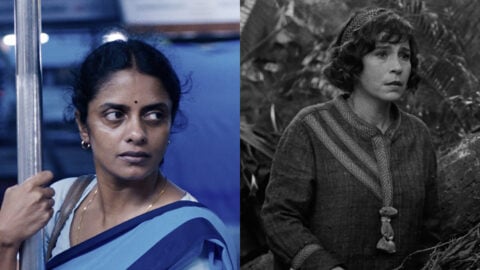Review: Jupiter Ascending

It’s not always easy to be a Mila Kunis fan. Certainly, there’s a lot to draw you in—keen comic timing, a voice that routinely shows more range in a single scene than some actresses manage over their entire careers, and alluring, distinctive features. Yet these very apparent strengths are all too often drowned out in Jupiter Ascending, the Wachowskis’ latest maximalist CGI onslaught which wobbles between borderline-incomprehensible spectacle and failed operatic drama.
Kunis plays Jupiter Jones, a toilet-scrubbing maid in Chicago who learns that she is genetically identical to the queen of the universe. She finds herself in danger but is saved by the half-man, half-wolf Caine Wise (a similarly wasted Channing Tatum), who goes on to be her guide. Unfortunately for the audience, explaining how exactly one ends up being the genetic replica of the queen of the universe, and what exactly that means, takes up two-thirds of the movie, with the sort of banter that seems to be required for most action films now. (The dialogue is like reading a website’s FAQ aloud: “We don’t have much time before the aegis come.” “The aegis?” “They’re like cops.” “Space cops. Sure.”)
The premise isn’t actually that convoluted, as it’s fundamentally a property dispute. A handful of planet-owning families “harvest” the genetic essence of these planets’ populations in order to extend their own lives. The queen to whom Jupiter is genetically identical is in fact dead but bequeathed her planets to her predictably decadent and corrupt children—Balem (Eddie Redmayne), Titus (Douglas Booth), and Kalique (Tuppence Middleton). The existence of Jupiter (who comes to light when she tries to make some extra money by selling her eggs) throws their holdings into question.

The coercion and foul play the siblings attempt aren’t terribly interesting when done through their various agents (the aforementioned “aegis” and assorted half-human creatures). But once these malicious heirs begin interacting directly with Jupiter, the movie acquires an almost subversive strain of camp. Regal and ridiculous, Titus suggests a Feyd from Dune (at one point, he’s even glimpsed floating around in flagrante delicto with several women in zero gravity), and the film’s best setpiece comes when he attempts to marry Jupiter—inside a cathedral that’s inside a spaceship—while a space battle rages outside. However, the real scene-stealer is Redmayne, who alternates between a husky whisper and abruptly shouting certain words at random. His delivery undercuts the seriousness of earlier moments between Jupiter and her Chicago family, but, as true camp does, underlines the outlandishness of a Cambridge-educated actor playing opposite an eight-foot tall CGI lizard man in some equally fake-looking castle on Jupiter (the planet).
Redmayne’s farcical grandiosity harkens back to science-fiction serials of the 1930s, but unfortunately so does Jupiter’s passivity throughout the film. I eventually lost count of how many times she needed to be saved by Caine, and while there’s an argument to be made about the film’s canny rejection of narrative closure, it’s incredibly tedious to sit through and builds towards nothing. (The Tom Cruise vehicle Edge of Tomorrow is probably the closest that mainstream film has come to commenting upon Hollywood’s reliance on formula and repetition, but even that failed to say much, let alone be very engrossing to watch; sadly, there has yet to be a Jeanne Dielman of the genre.)

But the Wachowskis repeat themselves a great deal in Jupiter Ascending without much insight. Among the hoards of homages to other films (including Brazil, complete with Terry Gilliam cameo) is the film’s use of the “you are the chosen one” narrative—inaugurated by The Matrix (99) and seen again and again in the current wave of dystopian YA-novel adaptations. There are also a few instances of bullet time—Caine has rocket boots, which means his shootouts are slowed down and are unbound by gravity—but even those aren’t as inventively realized as the original.
The most accomplished moments prove not to be the CGI battles, but instead the unbelievably lush, exquisitely designed costumes that are primarily bestowed upon non-speaking extras: flowing robes, vaulted cowls, floral embroidery on everything, and high-slit gowns. (The glaring exception is Tatum, clad in generic body-suit and given terrible facial hair and dog ears, which blunts his good looks.) Between this fashion savvy and appreciation for camp—previously seen in their equally uneven Cloud Atlas adaptation—it’s pretty obvious that the Wachowskis should abandon action entirely and get into musicals.







